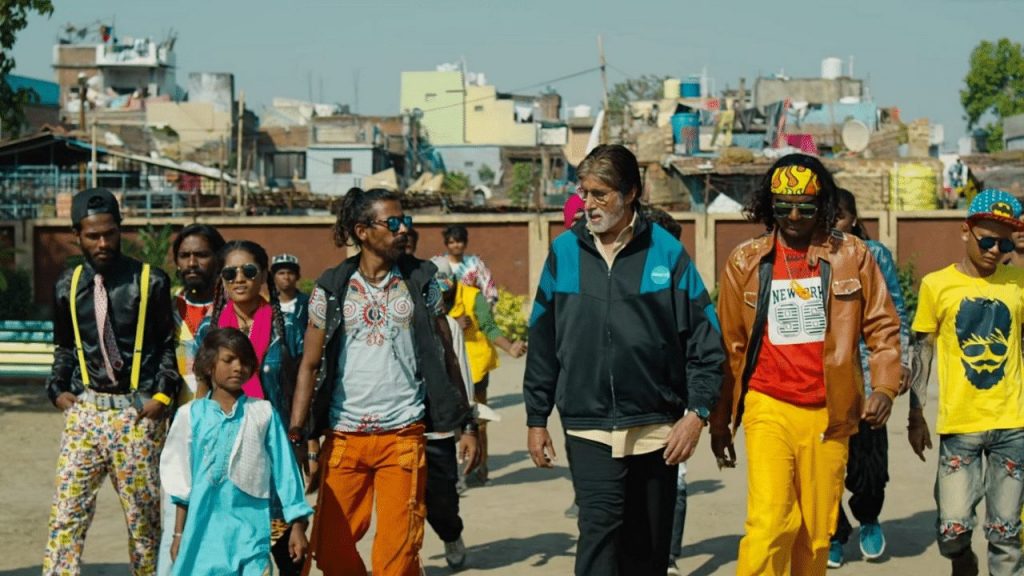Nagraj Popatrao Manjule’s third feature outing, Jhund (2022), effectively explores how sport can transform the lives of the poor and the oppressed. It is based on the real-life story of former sports teacher Vijay Barse, who founded the Slum Soccer Foundation, which aims at improving the lives of those residing in slums through football.
Jhund sees Ankush Masram (Ankush Gedam) aka Don, a hooligan residing in one of the slums of Gaddigodam in Nagpur. Along with his gang of men, women and children, he engages in small-time robberies like snatching chains and mobile phones. One day, Vijay Borade (Amitabh Bachchan), a sports teacher on the verge of retirement, observes the gang playing football with a make-shift ball. Discovering a spark in them, he entices them to play football with a real ball. As they develop a genuine interest in the game, Vijay trains them professionally. Not just to veer them away from their squalid existence of poverty, crime and drugs but to give them an opportunity to make something of their lives as well…
There is much that makes Jhund stand out from other triumph-of-the-underdog sport films. Coming from a marginalized community himself, Manjule brings much credibility and an astuteness to the film, particularly in capturing the vignettes of life in the squalor of the slums. His decision to cast real-life characters gives the film a sense of verisimilitude and helps us engage and empathize with them. As the various individuals from the slum narrate how and why they have been forced into a life of crime, they do not appear to be mouthing lines from a script. It is stark reality unfolding in front of us, making us feel as if we are watching a docudrama rather than a feel-good fiction film highlighting the triumph of the human spirit. And though not as raw or hard-hitting in its as his earlier Marathi features, Fandry (2013) and Sairat (2016), Jhund is nevertheless a potent enough film.
By displaying the photograph of Dr BR Ambedkar at certain key moments in the film, Manjule highlights the fact that the life of the Dalits and the downtrodden have not changed at all. Just how difficult life is for them is harrowingly brought out through the struggles of Monica (Rinku Rajguru) to acquire legal documents for applying for a passport. Manjule also makes metaphorical use of a wall that separates the slum dwellers from the college compound where the privileged classes practice football. The people from the slum have to climb this wall symbolically and physically to reach the playground because they are not allowed entry through the main gate. As the film ends and these characters board a flight, the plane flies over this very wall, thereby emphasizing the heights that these individuals have finally achieved.
That said, the film also has its share of weaker moments. Some of the songs seem to be forcefully integrated into the narrative rather than going naturally with the flow of the story. The romantic track between Ankush and his girlfriend, Bhavna, lacks depth and fails to make much of an impact. The courtroom monologue by Borade is so toned down that it loses its intended dramatic thrust while the climax of the film appears to be stretched to almost breaking point.
Jhund benefits greatly from the towering performance of Amitabh Bachchan as Vijay Borade. Thankfully, Manjule is not awed by the star persona of Bachchan. He gives him a real flesh and blood character to play and has crafted Borade with much subtlety. Borade always speaks politely and never argues with anyone throughout the film. Even when he is angry or emotionally hurt, he does not express it overtly. Such traits bring depth and understatement to his character. Ankush Gedam’s performance rings true right through the film while Shantanu Shrikant Bhake’s casting of the various characters from the slums deserves praise. They are absolutely natural and never give you the feeling that they are acting at any point. They live the characters they are meant to be. Akash Thosar and Rinku Rajguru, who played the lead in Sairat, are fine in their brief roles here.
On the technical side Sudhakar Reddy Yakkanti’s cinematography deserves praise, in particular, for the way the football matches in the film are shot. The production design by Snigdha Karmahe and Pankaj Pol merges well with the natural milieu of the film. The background score by Saket Kanetkar works harmoniously and enlivens the theme of the film. However, the editing by Kutub Inamdar and Vaibhav Dabhade could have been much tighter. The almost three hours running time of the film tells and how.
Overall, Manjule has balanced the themes of discrimination, ostracization and the dream for a better future amongst the downtrodden with such craftsmanship that it is not only realistic but also entertaining. Jhund proves yet again why he is one of the most exciting filmmakers in the country today.
Hindi, Sports, Drama, Color


